Orwell's 1984 Was Optimistic
This seminal novel by George Orwell is often thought of as the classic dystopian future story. Now that we're in the future, we can see that Orwell was actually quite optimistic.
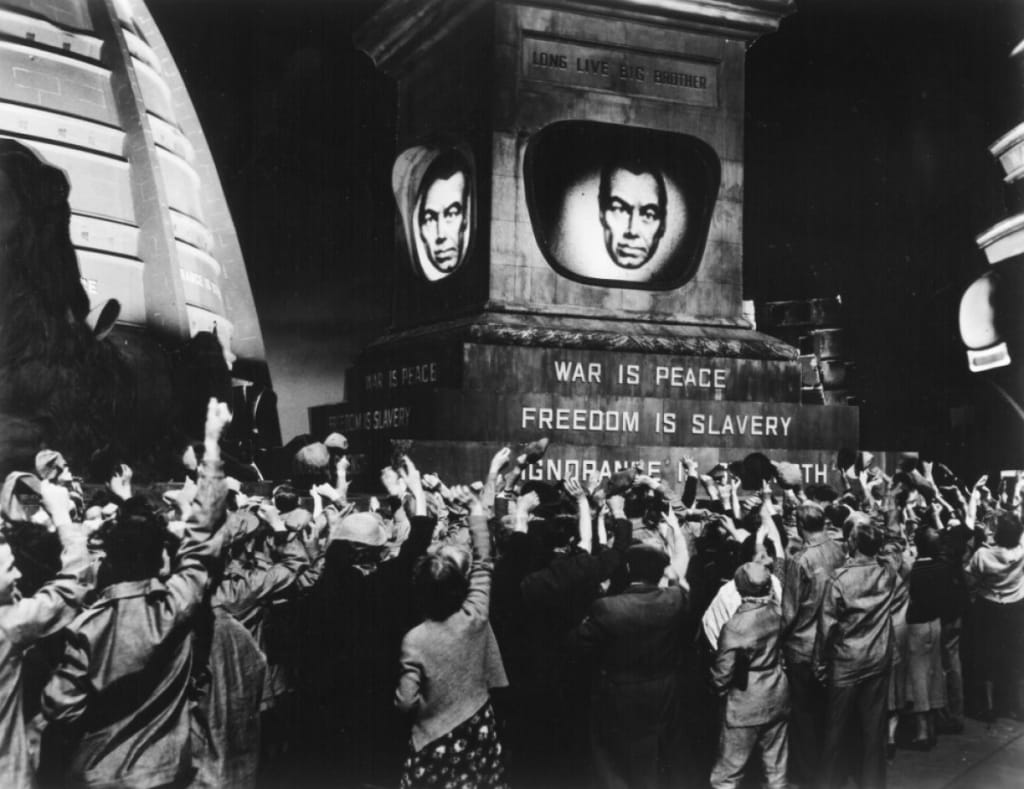
When George Orwell wrote his most famous, and last, novel, 1984, it was against a backdrop of rising fascist totalitarianism in Europe. Hitler, Stalin, Mussolini, Franco, all turned their respective democratic nations into oppressive regimes. While Hitler sought war with Europe, Stalin declared war on his own people, purging the Soviet Union of anyone he feared might usurp him – they numbered in the millions. It was after participating in the Spanish Civil War, against Franco’s Nationalists, that Orwell’s writing direction turned towards one of speaking out against totalitarianism and promoting democratic socialism.
Orwell was seriously ill with tuberculosis when he wrote 1984, and died shortly after it was published. The book has become immensely popular, selling millions of copies worldwide, and has been translated into sixty-five languages.
Orwellian is now a common phrase to describe the dystopian concept of overarching government surveillance on the people of a nation, or indeed anything that contributes to the destruction of a free and just society.
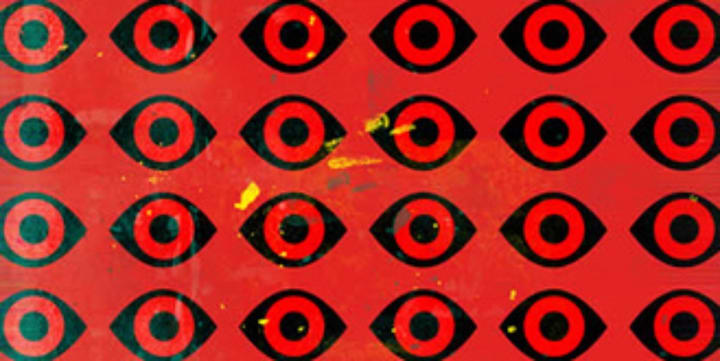
Dailydot.com
How Accurate was the Prediction?
So how close did George Orwell get to current reality? The novel is set in Great Britain, or Airstrip One as it is now known. The world is divided into three intercontinental states, two of which are always at war with the other over the world's remaining land mass, largely much of Africa, India and the Far East. The hero of the novel, Winston Smith, lives in Oceania (which includes Airstrip One as its only European state) and can be said to comprise the Western hemisphere, together with South Africa and Australasia. Eurasia comprises continental Europe plus the old USSR. Finally, Eastasia, the smallest province, might be described as a roughly Sino-Indian rectangle.
The triangular social demographic of Oceania certainly looks familiar. At the apex is Big Brother, never seen but undeniably deified. Effectively manning the top, therefore, is the elite 2% which form the Inner Party. Beneath these, the next 13% of the population, including Winston, form the Outer Party. These are Oceania’s middle classes. Buttressing this combined minority are the Proles, the uneducated working class, trapped eternally in poverty and tranquilized with a diet of alcohol, pornography and the futile dreams of a zero-payout national lottery.
Unsurprisingly it is Big Brother’s Inner Party that has the rest of the population on a leash, with the Outer Party as a tight studded collar round the pooch’s neck; the pooch of course representing the poor, stoic Proles. Oceania is run as a totalitarian state, with obvious historical comparisons to Hitler’s Nazi Germany and Stalin’s Soviet Union. Its political ideology is English Socialism, or Ingsoc as the state prefers to call it as part of its agenda to control language and clip words to the bone. This new language of oppression is called Newspeak, and some of its more common words have even infiltrated the modern English Language, for example, doublethink and thoughtcrime.
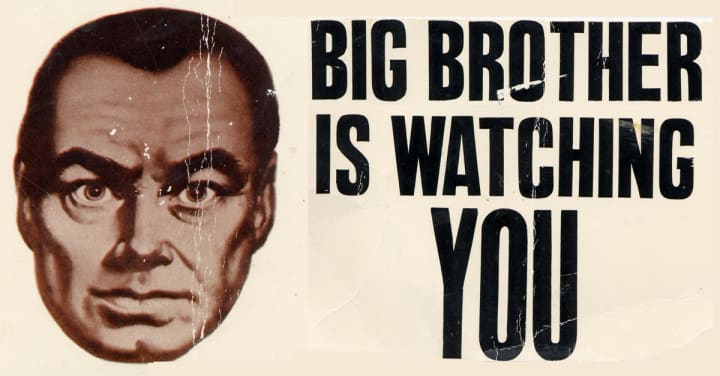
Openculture.com
Political Structure
Cynics among you might note a disturbing similarity between Orwell’s dystopian class paradigm and contemporary American society. As with most democratic countries, the USA has a middle class and a working class, overseen by a much smaller, and slightly shadowy political elite. There’s nothing really surprising or sinister about this so far. Each chess game is set up in a standard way; it’s how the adversaries play that matters.
Oceania’s Inner Party, under the baleful gaze of Big Brother, desire only one thing: absolute power. The welfare of their pawn Proles is irrelevant. The welfare of the intermediate Outer Party is relevant to the Inner Party only insomuch that it is a powerful machine to achieve their goal.
Here’s then where fact and fiction separate a little. Not only is the U.S. president a real, smiling, hand-waving person, the idea that he and his party crave absolute power at the expense of the American populace is about as hard to digest as an overbaked pretzel. Maybe some in the party crave some personal power and standing among their peers, but total domination over three hundred million citizens seems implausible. The USA has an economy also that stretches far beyond military provision, even if, yes, their involvements in Middle East conflicts have an unnerving tendency to keep recycling themselves. Oceania's policy is to drain the economy through continual war with one province or another, so that the Proles remained oppressed, short of boots and food. The U.S. economy admittedly serves its people; any American citizen can through hard honest labor and perseverance acquire the American Dream. The National Lottery does pay out; if media photos of winners are to be believed.
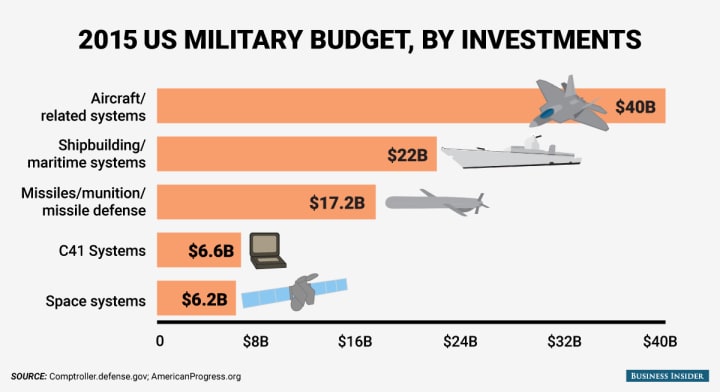
BusinessInsider.com
Technology and Privacy
Where George Orwell underestimated Big Brother totalitarianism, and only probably because he failed to foresee the invention of the cellphone, was with the ceaseless government surveillance of its citizens. In 1984, telescreens and microphones are placed in people’s houses and workplaces. The telescreens offer a two-way broadcast: a constant transmitting of government doublethink, while information about what the brainwashed citizen is saying and doing is simultaneously returned to Big Brother. Letters are routinely opened and read by party officials for evidence of thoughtcrime. How does this compare with present day smartphones, where the user’s exact GPS location is continually being transmitted to the National Security Agency? The object of surveillance even gets to purchase the data-transmitting smartphone themselves. Maybe this electronic betrayer of trust was even a Christmas present from a spouse or parent. Either way, it’s a win-win for the NSA.
It’s not just smartphones. The NSA monitors all phone calls and emails. It doesn’t read more than a small minority of these communications; instead it stores the records in the form of metadata in a data repository. Email metadata is globally harvested by the NSA’s Sigint collection system and routed to a repository code-named Marina, where they are kept for a year. (Sigint stands for Signals Intelligence, a rather disturbing parallel use of Newspeak by the NSA.) It’s important to note that metadata is data about the containers of data, and not the data inside those containers. Still, nothing else currently available completes the picture of an individual quite so well as electronic metadata. It includes browsing history, account details, contacts information, Facebook posts, instant messaging, and, of course, all emails are stored there. The NSA refers to this electronic picture as an individual’s pattern-of-life. If Oceania’s Inner Party had possessed this technology they would have been laughing; well maybe, if laughing hadn’t been outlawed by the State. All they have instead are millions of bulky cathode-tube telescreens, which their Outer Party minions undoubtedly get the job of installing and maintaining.
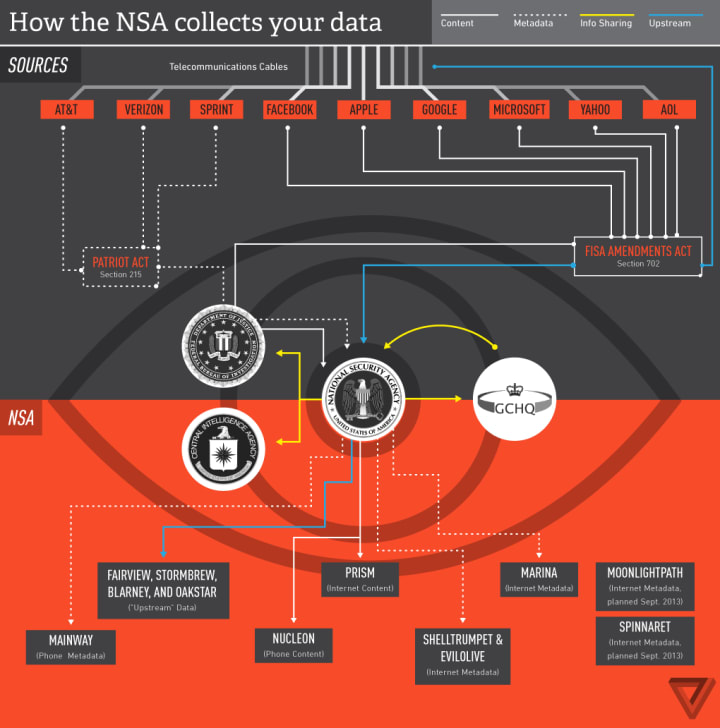
TheVerge.com
Nowhere to Hide
Winston tries to acquire for himself a little piece of freedom and individualism by purchasing a diary. Returning to his flat from another dreary day at the Ministry of Truth, he sits in his alcove, a spot he mistakenly believes to be beyond the telescreen’s audiovisual scope. Then, in a frenzy of gin-fueled rebellion, he scribbles in his diary, ‘DOWN WITH BIG BROTHER’. Fatalistic as always, Winston knows his treasonable writings will eventually be discovered by the authorities, and he will be shot.
Yet Winston took some precaution to conceal his illegal professions of hatred for the State. He bought a diary; he tried to hide in an alcove. When he meets his lover, Julia, whom he initially distrusts, they hold hands in a crowd so this illegal show of stirring love isn’t revealed to the surveillance machinery of Big Brother. These declarations of hate for the state, and love for another, have at least a chance of succeeding unnoticed because in 1984 the conduits of communication are still non-electronic. Today of course, holding hands and writing in diaries can be carried out publically or in private. We live in a free, democratic society. Yet our primary means of communication to each other are now electronic: smartphones, cellphones, tablets, laptops. We dispense packets of data at rapid fire velocity to our loved ones without much thought or understanding how they really travel and how we can protect them from the snoops, whether criminal or government. What precautions can we take to protect this electronic data from the NSA, for example? Sadly, it seems none. Even the most sophisticated encryption protocols can be cracked now by the government. This again raises questions about civil liberties, but for the moment we should accept that our electronic communications are within easy grasp of the NSA, even if the majority of us are not considered of interest, or a threat to national security.
It is the exponential power of today’s communication technology which George Orwell could never have prophesied. Its ability to infiltrate every home and workplace, sift through the personal data of every individual, under the auspices of government surveillance agencies, makes 1984’s dystopian vision look rather optimistic.
About the Creator
Jacob Frommer
A writer who enjoys beer, herring and conversation.




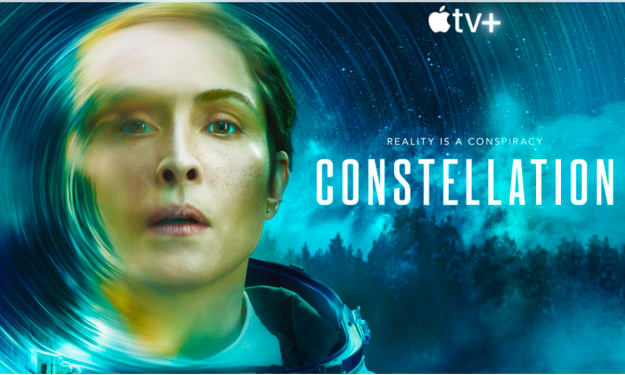

Comments
There are no comments for this story
Be the first to respond and start the conversation.